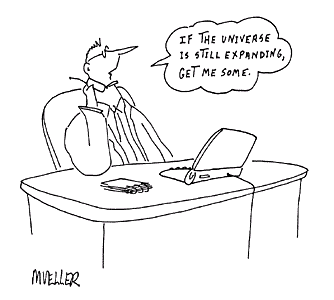

Expanding Universe :
The expanding Universe, the dynamic state of the extragalactic realm, is the discovery of which has transformed 20th-century cosmology. The development of general relativity and its application to cosmology by Albert Einstein, Wilhelm de Sitter, and other theoreticians, along with the detection of extragalactic redshift (a shift to the longer wavelengths of light from galaxies beyond the Milky Way) by Vesto Slipher, led to the realization in the 1920s that all galaxies are receding. Edwin Hubble correlated these observations in mathematical form to provide evidence that the universe is expanding. The discovery of the 2.7 K background radiation in 1965 by Arno A. Penzias and Robert W. Wilson is regarded as convincing evidence that the universe originated approximately 15 billion years ago in a very dense and hot state referred to as the big bang.

Observations so far have not succeeded in determining whether the universe is open (of infinite extent in space) or closed (of finite extent) and whether the universe in the future will continue to expand indefinitely or will eventually collapse back into an extremely dense, congested state.
Excerpt from the Encyclopedia Britannica without permission.